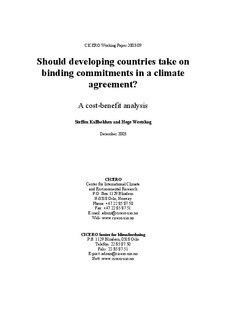| dc.contributor.author | Kallbekken, Steffen | nb_NO |
| dc.contributor.author | Westskog, Hege | nb_NO |
| dc.date.accessioned | 2014-03-17T14:31:24Z | |
| dc.date.available | 2014-03-17T14:31:24Z | |
| dc.date.issued | 2003 | nb_NO |
| dc.identifier.issn | 0504-452X | nb_NO |
| dc.identifier.uri | http://hdl.handle.net/11250/192330 | |
| dc.description.abstract | This paper explores the costs and benefits for all parties to a future climate agreement of developing countries taking on binding commitments. Such commitments would allow developing countries to participate in emissions trading, which has significantly lower transaction costs than the present Clean Development Mechanism (CDM). Thus we analyse whether the efficiency gains obtained by participating in emissions trading can offset the economic risk (due to the fact that future emissions cannot be known) incurred by taking on binding commitments. We use a dynamic computable general equilibrium model to carry out the analysis. We find that the efficiency gains that can be obtained by developing countries might not be very large compared to the risks they incur. Developing countries might therefore have good reasons not to embrace “cap and trade” emissions trading. | nb_NO |
| dc.language.iso | eng | nb_NO |
| dc.publisher | CICERO Center for International Climate and Environmental Research - Oslo | nb_NO |
| dc.relation.ispartof | CICERO Working Paper | nb_NO |
| dc.relation.ispartofseries | CICERO Working Paper;2003:09 | nb_NO |
| dc.title | Should developing countries take on binding commitments in a climate agreement? A cost-benefit analysis | nb_NO |
| dc.type | Working paper | nb_NO |
| dc.source.pagenumber | 13 | nb_NO |
